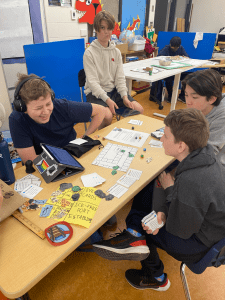The Project Path
Welcome to “A Case for a Nation”. The nationalism/confederation DIY project. In this project, we brainstormed symbols of Canada, simulated confederation, and made a board game and corresponding rules.
My Learning Adventure
This project helped me learn about a whole range of things. Specifically, Canadian history. It’s funny to think that even though I live in Canada, I knew so little about its actual history. I learned a lot about PEI, along with all the other colonies and their histories before confederation brought them together to form the Canada we know today.
A little bonus thing I learned is in the “Symbols of Canada” activity, I researched Tim Hortons and learned more about how it came to be and it’s long history in Canada since 1964.
The Skills
In this project, I got better at making big decisions based on available knowledge (confederation simulation). I also was able to further strengthen my AR and video editing skills with the “Symbols of Canada” activity. Another thing I was able to get better at is thinking up, designing, and creating board games (collaboratively). The last time I had the chance to do this was back in grade 8, with the “Tectonic Chances” board game in Scimatics. I feel like I’ve come along way and can be proud of my (and my groupmate’s) work.
My Work
“The representatives of PEI chose to reject the Confederation invitation, but if the Confederation in the future becomes a stable, safe, and secure place, we will join at a later date. As of now, they remain a neutral party, not allying with either the U.S. or the Confederation. They made this decision due to the fact that two of their biggest and most pressing conditions weren’t met, and the situation of the economy. It would be too expensive for citizens of PEI to live in such a society where they’re basically poor all the time. Canada East and West benefitted from Confederation the most, as apposed to smaller colonies like PEI, who got the short end of the stick. The colony of PEI made significant efforts and struggle to have their demands met, and though they managed to have some of the more communal requests satisfied, they still couldn’t get the two biggest demands agreed with. I noticed that Confederation is a very tricky thing, where lots of hard agreements and bargains are made. This can be very troubling for smaller colonies as they may be ignored by bigger colonies and such.”
– Confederation Simulation Reflection

Driving Question and Answer
What did nationalism mean for people around Canada?
Nationalism is a complex concept that can have different meanings for different people. In Canada, nationalism can be understood in multiple ways, depending on influences such as cultural, political, and historical contexts.
For some Canadians, nationalism is a sense of pride and loyalty towards the country and its symbols, such as the flag, the anthem, and the maple leaf. This kind of nationalism is often referred to as civic nationalism (which I didn’t know until now), which emphasizes a shared political identity based on a common set of values, such as democracy, human rights, and the rule of law.
For others, nationalism is more closely tied to their cultural identity, language, and history. This form of nationalism is often referred to as ethnic nationalism (which I did actually know to call it), which emphasizes a shared ancestry, culture, and language as the basis of national identity. In Canada, this kind of nationalism is often associated with Quebec, which has a distinct French-speaking culture and a history of separatist movements.
In some cases, nationalism can also be tied to political movements or ideologies. For example, some Canadians may identify with a particular political party or ideology, such as conservatism or socialism, and view their political beliefs as an expression of national identity.
Overall, nationalism in Canada is a complex and diverse concept that can mean different things to different people, depending on their cultural, political, and historical backgrounds.